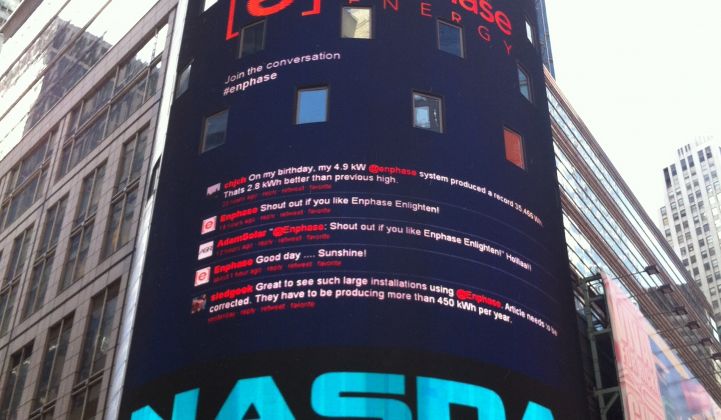After a long drought, a solar company has made it through the IPO window.
Enphase, after lowering its IPO price to $6.00 per share (down from the $10.00 to $12.00 per share range set earlier this month), has crossed over from private to public company. The Petaluma, Calif.-based microinverter startup will trade on the Nasdaq with stock symbol ENPH. The microinverter startup raised $54 million in its initial public offering and has a market cap of approximately $275 million. We'll check in over the course of the day with updates on the price of the stock.
The IPO is cause for at least a bit of optimism in the solar and cleantech industries. Investors, entrepreneurs and competitors will be watching closely.
The maiden offering comes nine months after the IPO was registered with the SEC. Here's a link to the prospectus.
VC investors in Enphase include Third Point Ventures (with a 19.1 percent pre-IPO stake), Rockport Capital Partners (18.1 percent), Madrone Partners (14.8 percent), Kleiner Perkins Caufield & Byers (7.7 percent), Applied Ventures (6.3 percent) and Bay Partners (5.5 percent). Morgan Stanley, BoA Merrill Lynch, and Deutsche Bank were the underwriters.
Here are some of the new stats from Enphase's recently updated S-1 document:
- The firm has raised more than $88 million in VC funding.
- The firm has shipped more than 1.55 million microinverters since its founding, 1 million in 2011 alone.
- Enphase estimates that that represents about 40,000 installations.
- Canada accounted for 12 percent of revenue in 2011.
- Net revenues were $20.2 million, $61.7 million and $149.5 million for the years ended December 31, 2009, 2010, and 2011, respectively.
- Net losses were $16.9 million, $21.8 million and $32.3 million for the years ended December 31, 2009, 2010 and 2011, respectively.
- The firm expects to incur a net loss in 2012.
- At the end of 2011, the firm had 298 employees.
- Enphase market share of the PV inverter market in California for residential installations was 34.4 percent at the end of 2011, based on total wattage, with data from the CSI.
- Enphase market share of the PV inverter market in California in the 10-kilowatt to 100-kilowatt small commercial sector was 16.5 percent at the end of 2011, based on total wattage, with data from the CSI. Microinverters, DC optimizers and other PV distributed optimization technologies still represented only about 2 percent of the solar inverter market in 2010, according to GTM Research. In other words, the microinverter battle is a small part of the war, and has yet to prove it has staying power.
Other microinverter firms include Power-One and SMA and Enecsys, a British startup with about one-hundredth the number of microinverters deployed as Enphase, Germany’s SMA and Power-One’s microinverter, as well as DC optimizers and other architectures from Direct Grid, SolarEdge, Tigo, eIQ, etc.
GTM Research inverter expert MJ Shiao also had these observations:
- Estimated costs for the most recent quarter are $0.57 per watt (AC) versus $0.63 per watt (AC) , indicating that scale and the shift to the new product are having an effect.
- ASPs dropped from $0.78 per watt to $0.74 per watt.
- At this point, Enphase has the microinverter market in North America cornered, and its expansion into Europe is quickly cutting off prospects for newer microinverter companies.
- Over $500 million of venture capital has poured into the space, with our estimate for the total market value for microinverters and DC optimizers to reach only $1.2 billion by 2015. The leading suppliers (Enphase and SolarEdge) combine to account for 40 percent of that VC.
- A note about consolidation: it's unlikely that many of those companies will be bought out. Centralized inverter companies have been far from enthusiastic about microinverters or producing their own DC optimization. The move into the space by seems more of an afterthought than a focus. As the U.S. and other emerging markets move toward utility-scale projects, central inverter companies may be content to cede the share of residential projects stolen from string inverters by microinverters.
The big challenges for Enphase are to keep this meteoric sales growth going amidst increasing competition and to find a path to profitability in a still difficult market.
_562_406_80.jpg)



